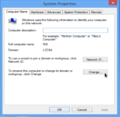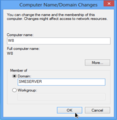Difference between revisions of "Windows 8 Support"
| Line 65: | Line 65: | ||
| − | If you are not worried about being instantly and directly connected to the Cloud or the Windows Store and are not interested in having your settings synced between multiple Windows 8 systems, then you may want to sign in to Windows 8 using a Local account. This Local Account is mandatory if you want to use all the services that an SME Server Domain can give you.<br /> | + | If you are not worried about being instantly and directly connected to the Cloud or the Windows Store and are not interested in having your settings synced between multiple Windows 8 systems, then you may want to sign in to Windows 8 using a Local account. This Local Account is mandatory if you want to use all the services that an SME Server Domain can give to you.<br /> |
Now, keep in mind that when you use a Local account, you will still be able to access everything in the Windows Store or SkyDrive, but accessing them will require that you first sign in with your Microsoft account credentials. For example, the first time that you attempt to access SkyDrive, you'll have to enter your Microsoft account credentials. After you do so for the first time, your credentials will be saved. Once your credentials are saved, you will be able to access the service just as if you were using a Microsoft account. | Now, keep in mind that when you use a Local account, you will still be able to access everything in the Windows Store or SkyDrive, but accessing them will require that you first sign in with your Microsoft account credentials. For example, the first time that you attempt to access SkyDrive, you'll have to enter your Microsoft account credentials. After you do so for the first time, your credentials will be saved. Once your credentials are saved, you will be able to access the service just as if you were using a Microsoft account. | ||
Revision as of 22:46, 6 August 2013
Background
Windows 8 was released in december 2012. Due to changes in the way that trust relationships are established with domain controllers, older versions of Samba (need at least 3.6.6) do not allow Windows 8 clients to log in once joined to a domain. see bugzilla:7172
Join a SME Server 8.0 Domain with Win8
Previously you needed to edit your Win8 registry to facilitate the joining of a SME Server Domain, however this can more easily be achieved by importing win8samba.reg fix by using either a usb key or by the network with http.
- Save the Win8 registry patch (win8samba.reg) from https://your-server-ip/server-resources/regedit/ with your favourite web browser.
- On your windows desktop, start "regedit" from the search menu in the top right corner and import the win8samba.reg.
- Set your domain instead of your workgroup. Add the client machine to the domain as normal.
- When asked on your Windows PC use the 'admin'(*) username and your SME Server admins password.
- You should get back the response 'Connected to Domain'
- You have to reboot your computer to reach the Domain
(*) Admin or any user in the 'Domain Admins' group can join the domain.
Microsoft Account or Local account
There are two types of Windows 8 User accounts to choose from:
- Microsoft account
When you sign into Windows 8 with a Microsoft account:
- You must associate an email address with your Windows 8 User account.
- Microsoft apps automatically update online content.
- Your settings will be synced across other Windows 8 PCs you use.
- Local account
When you sign into Windows 8 with a Local account:
- You are not required to associate an email address with your Windows 8 User account.
- You will have to create a new user account for each Windows 8 PC you use.
- Your settings won't be synced across the Windows 8 PCs you use.
If you are not worried about being instantly and directly connected to the Cloud or the Windows Store and are not interested in having your settings synced between multiple Windows 8 systems, then you may want to sign in to Windows 8 using a Local account. This Local Account is mandatory if you want to use all the services that an SME Server Domain can give to you.
Now, keep in mind that when you use a Local account, you will still be able to access everything in the Windows Store or SkyDrive, but accessing them will require that you first sign in with your Microsoft account credentials. For example, the first time that you attempt to access SkyDrive, you'll have to enter your Microsoft account credentials. After you do so for the first time, your credentials will be saved. Once your credentials are saved, you will be able to access the service just as if you were using a Microsoft account.
Slow login with win8 to sme8 domain
With certain networks you may have an issue with a slow login to the SME Server domain due to a timeout issue on the network. In this case you should install a second patch (in first you have to install the win8samba.reg). The history of this patch can be found at bugzilla:7332
The version of package needed e-smith-samba-2.2.0-57.el5.sme is in smeupdates-testing but will shortly be by default in smeupdates so in the first instance verify your package version
rpm -qa e-smith-samba e-smith-samba-2.2.0-57.el5.sme
You need at least this version as above, otherwise try this
yum update --enablerepo=smeupdates-testing e-smith-samba signal-event post-upgrade; signal-event reboot
This is what you need to find in your server-ressources
cat /home/e-smith/files/server-resources/regedit/windows_samba_performance.reg
Windows Registry Editor Version 5.00 [HKEY_LOCAL_MACHINE\SOFTWARE\Policies\Microsoft\Windows\System] "SlowLinkDetectEnabled"=dword:00000000 "DeleteRoamingCache"=dword:00000001 "WaitForNetwork"=dword:00000000 "CompatibleRUPSecurity"=dword:00000001
After this you follow the usual way to add the patch to your windows registery
- Save the registry patch (windows_samba_performance.reg) from https://your-server-ip/server-resources/regedit/ with your favourite web browser
- On your windows desktop, start "regedit" from the start menu and import the windows_samba_performance.reg





